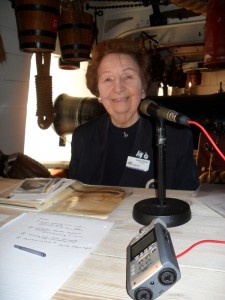
On 2 December 2011 I interviewed Dorrie, a former member of the WRNS (Women’s Royal Naval Service) on board HMS Warrior in the Portsmouth Historic Dockyard
Oral History is now recognised as a valuable and credible method to engage with and learn about the past.[i] Oral historians indicate that oral history research requires a different set of interpretative practises as it is a source that necessitates historians to directly engage with subjectivity.[ii] The interview is a source created by a shared narrative formed as a narrative between the interviewer and interviewee. For my research I have found semi structured interviews with open ended questions to have been beneficial. This approach means that the emphasis is upon the interviewee, whereby they can shape the direction of the interview and share information they feel to be important.
Oral history has democratic possibilities, anyone has the potential to interview or be interviewed. It is important that the stories of individuals are preserved. This is particularly pertinent as ship building in Portsmouth is under threat. As shipbuilding draws to a close in Portsmouth, meaning a loss of skilled expertise at a local level it is important that the contribution of these men and women is not forgotten. My interviews from a local case study of women war workers from Portsmouth and the Isle of Wight during the Second World War has revealed some important themes: selfhood, agency and identity. Individuals all have different views, which show regardless of class, gender or race that agency and consciousness are significant factors for analysis. Anna Green states that
Thus Green is advocating there is a need for individual memories to be analysed more extensively and to feature more prominently within contemporary research.
Notions of community and comradeship have shown that alongside the importance of individuality, a sense of a shared past and collective identity is also relevant. This is especially true within port towns. Port town workers were most likely working long hours, and in close contact with other people. I have interviewed two Wrens: Grace and Dorrie (pictured above), both identified that their service in the Wrens shaped their own sense of self but also regarded themselves as part of a group. This has left a lasting impression and positive legacy for them both, by maintained friendships with former Wrens and through the WRNS Benevolent Trust. Grace said: “We were proud of what we did and I think you’ll never forget that period of service ever…it’s quite a watershed in your life”.[iv] Oral history is an enriching methodology that benefits academic study and preserves the memories of individuals and groups. It has reshaped my understandings of the past and the interaction between memory and discourse. If anyone has the opportunity to conduct an interview/s I would highly recommend it.
References
[i] Piers Dudgeon, Our East End Memories of Life Disappearing in Britain, (London: Headline Review, 2008); p. 337; Martin Evans, The Memory of Resistance French Opposition to the Algerian War (1954-1962), (Oxford: Berg, 1997); pp. 3-4; Ronald J. Grele, ‘Listening to their Voices, Two Case Studies in the Interpretation of Oral History Interviews’, Oral History, Vol. 7, No. 1, spring 1979, pp. 33-42; p. 33; Ronald J. Grele, ‘Listen to Their Voices: Two Case Studies in the Interpretation of Oral History Interviews’, in Ronald J. Grele, with Studs Terkel, Jan Vansina, Dennis Tedlock, Saul Benison, Saul and Alice Kessler Harris, Envelopes of Sound The Art of Oral History, Second edition, (New York: Praeger, 1991 [first edition 1985]), pp. 212-236; p. 213; Alessandro Portelli, The Death of Luigi Trastulli and other Stories Form and Meaning in Oral History, (New York, State University of New York Press, 1991); p. 50; Ralph Samuel, ‘People’s History’, in John Tosh (ed.), Historians on History, (Harlow: Longman, 2000), pp. 110-118; p. 111; Paul Thompson, ‘Oral History and the Historian’, History Today, Vol. 33, June 1983, pp. 24-28; p. 26 ; Paul Thompson, The Voice of the Past Oral History, Third edition, (Oxford: Oxford University Press, 2000 [first edition 1978, second 1988]); p. 4, 7.
[ii] Grele, ‘Listen to Their Voices’, in Grele, Envelopes of Sound, p. 215; Portelli, Death of Luigi Trastulli, p. 50.
[iii] Anna Green, ‘Can Memory Be Collective?’, in Donald A. Ritchie (ed.), The Oxford Handbook of Oral History, (Oxford: Oxford University Press, 2012), pp. 96-111; p. 108
[iv] Interview with Grace, 10 November 2011.










Comments are closed.